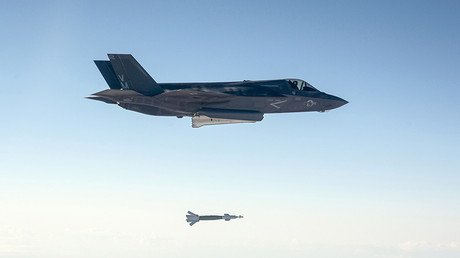RT may soon be dropped by US providers, courtesy of McCain & Graham
Buried deep inside the just-passed defense budget is a small amendment, which could lead to a ban on broadcasting RT in America. The architects of the provision, Senators Graham and McCain, may recall that in their youth such practices formed what was known as the ‘Iron Curtain’.
The National Defense Authorization Act (NDAA) for the fiscal year 2018, which was passed by the US Senate earlier this week, is stuffed with provisions that have little to do with US national defense. This is a tactic that US lawmakers have traditionally used to ‘piggy-back’ legislation which would have little hope of adoption as a stand-alone bill.
Deep down the list of amendments is No 1096, which aims to “prohibit multichannel video programming distributors from being required to carry certain video content that is owned or controlled by the Government of the Russian Federation”.
Proposed by Senator Lindsey Graham (R-South Carolina) and co-sponsored by Sen. Sheldon Whitehouse (D-Rhode Island), the amendment was submitted by John McCain (R-Arizona), a fellow foreign policy hawk. The provision says a distributor working in a US jurisdiction “may not be directly or indirectly required” to carry video content that is “is owned, controlled, or financed (in whole or in part) by the Government of the Russian Federation.”
In plain English then, any contract RT currently has or will have with American cable and satellite networks to carry its programming will no longer be protected by US federal law after this amendment is signed into law by President Donald Trump. The channel’s current arrangements with carriers made it illegal for them to arbitrarily drop RT’s programming (unless the content shown was obscene) but now they will apparently be able to discriminate against it should they so wish.
The discussion on how the US could insulate its population from RT was sparked by a declassified US intelligence community report on alleged Russian meddling in the 2016 presidential election, which put this channel in the spotlight. The report asserted that RT was a primary tool of such interference, done through critical reporting on US foreign policy and domestic problems. Despite the report containing factual errors and no evidence, it was taken at face value by many US media outlets and politicians.
“There is an obsession on Capitol hill and in the mainstream media with RT, because RT is effective and because RT is watched. But also because RT carries perspectives that are not available on the mainstream media,” commented Daniel McAdams, Executive Director for the Ron Paul Institute.
“The fact of the matter is that John McCain and Lindsey Graham, the people behind this amendment, the Atlantic Council and the others that are trying to silence RT – they are the totalitarians, they are the enemies of free speech, the enemies of the First Amendment.”
The move seems to resemble the strategy of the Soviet government, which strictly controlled domestic media and suppressed radio broadcasts from Europe to insulate the population of the country from ideas and narratives it deemed unfit. The censorship system, dubbed the “Iron Curtain”, backfired and became a major factor in eroding the Communist Party’s control, for the simple reason that people perceived media sources which the government tried to silence as more trustworthy than those it allowed.














